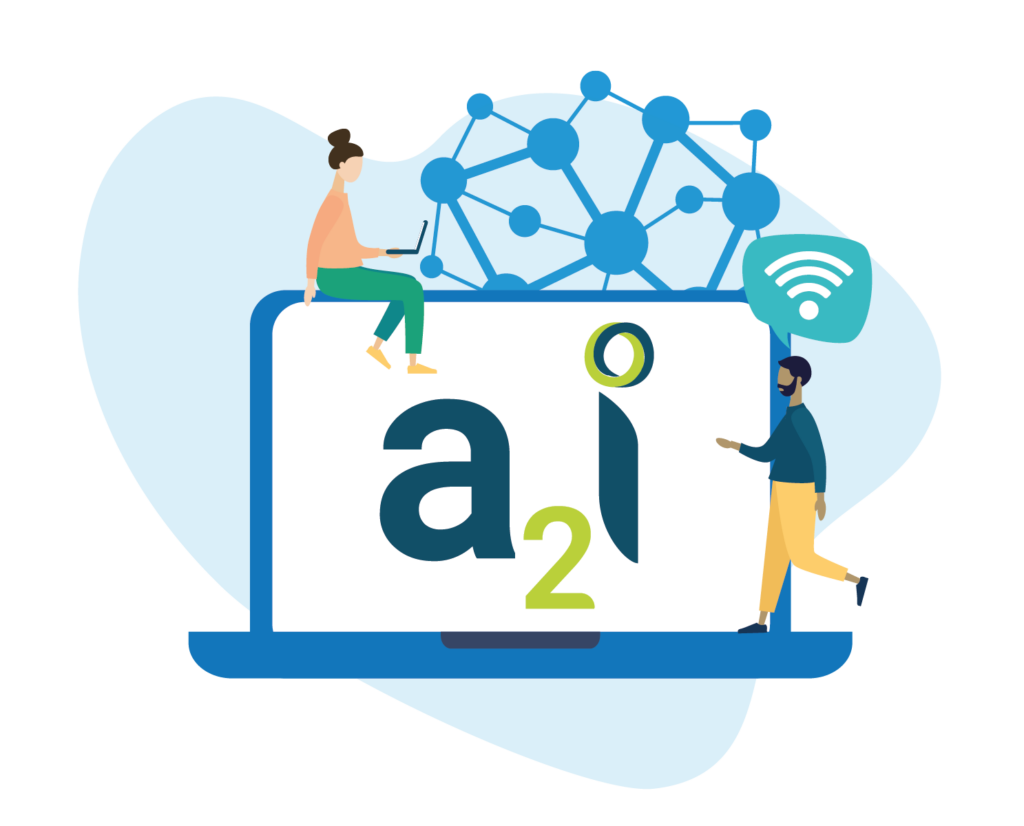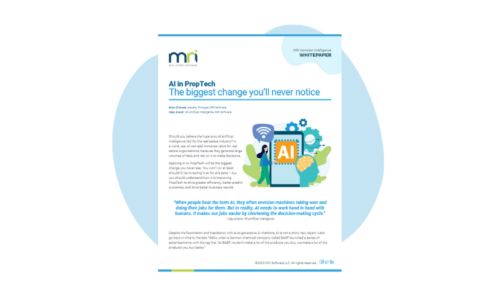AI in real estate: Balancing innovation with ethical responsibility
AI in real estate is transforming the industry by enhancing efficiency, accuracy, and customer experience. MRI Software are leaders in innovative real estate software and in this article, we explore how AI is reshaping residential property management software and real estate CRM solutions.
By understanding these advancements, real estate professionals can leverage AI to streamline operations and make informed decisions. Join us as we navigate the dynamic intersection of technology and real estate and discover how AI is setting new industry standards.
The best innovation is grounded in proven problems, and we are seeing trends that are creating marketplace answerability for AI solutions around the tangible productivity lift and more transparency around cost and return.
– Dr Sarah Bell, Director, Strategic Partnerships at MRI Software
The Role of AI in Real Estate
AI is revolutionizing the real estate industry by offering tools and solutions that enhance efficiency, accuracy, and customer experience. As real estate professionals, you are likely witnessing how AI-driven technologies streamline various processes, providing insights and capabilities that were previously unimaginable. From market predictions to fraud detection, AI is becoming an indispensable asset in your toolkit.
- Predictive Analytics for Market Trends: AI algorithms analyze vast amounts of data to forecast market trends, guiding investors and developers on optimal property transactions.
- Virtual Property Tours and Augmented Reality: AI-powered virtual tours and AR allow potential buyers to explore properties remotely, offering a realistic sense of the space without a physical visit.
- Automated Valuation Models (AVMs): AI-driven AVMs use historical data, market trends, and property characteristics to deliver accurate and instant property valuations, streamlining appraisals.
- Chatbots and Virtual Assistants: AI chatbots and virtual assistants provide 24/7 customer service, answering inquiries, scheduling viewings, and enhancing the customer experience.
- Smart Property Management: AI in property management includes automated maintenance scheduling, energy management, and tenant communications, improving efficiency and reducing costs.
- Fraud Detection: AI systems analyze transaction patterns to flag unusual activities, aiding in the detection and prevention of fraudulent transactions.
- Targeted Marketing and Lead Generation: AI analyses user data and behavior to create targeted marketing campaigns, improving lead generation and conversion rates.
- Image Recognition and Analysis: AI-powered tools can assess property photos to evaluate features, condition, and estimate renovation costs, aiding listings and appraisals.
- AI to Write Property Listings: AI generates property descriptions, manages photography uploads, client portals, live reports, and real-time interactions, saving time and effort.
- Space Optimization and Design: AI tools optimize property design and layout, using data to suggest the most efficient use of space, beneficial for commercial real estate and urban planning.
These AI applications are not only transforming how you conduct business but also setting new standards in the industry. By leveraging AI, you can make more informed decisions, offer superior customer service, and stay ahead in a competitive market.
The integration of AI in real estate signifies a future where innovation and efficiency go hand in hand, enhancing every aspect of the industry.
Benefits of AI in Real Estate
There is a range of benefits you can achieve through embracing AI to assist with your real estate services. Let’s take a look at some of the main ones.
Efficiency and Time Saving
AI significantly enhances efficiency in real estate by streamlining property searches and transactions. Advanced algorithms quickly sift through vast databases to match buyers with properties that meet their criteria, reducing the time spent on manual searches. This not only accelerates the buying process but also ensures that potential buyers are presented with the most relevant options, improving their overall experience.
Automation powered by AI reduces the burden of administrative tasks. Tasks such as document processing, scheduling appointments, and managing communications are handled seamlessly by AI systems. This allows real estate professionals to focus more on client relationships and strategic decisions. By minimizing manual effort, AI helps you save valuable time and resources, making your operations more efficient and effective.
Enhanced Customer Experience
AI enhances the customer experience in real estate by offering personalized property recommendations. By analyzing user preferences and behavior, AI systems can suggest properties that align closely with individual needs and desires. This personalized approach makes property searches more efficient and satisfying for potential buyers, increasing their likelihood of finding the perfect property.
Improved virtual tour experiences are another significant benefit of AI. High-quality, AI-powered virtual tours and augmented reality features allow clients to explore properties in detail from the comfort of their homes. These immersive experiences provide a realistic sense of the space, helping buyers make informed decisions without the need for physical visits. This not only enhances convenience but also broadens the reach of property listings to a global audience.
Market Insights and Decision Making
AI provides valuable data-driven insights for buyers, sellers, and investors in the real estate market. By analyzing extensive datasets, AI systems can uncover patterns and trends that inform strategic decision-making. These insights help stakeholders understand market conditions, optimize pricing strategies, and identify the best opportunities for investment, ensuring more informed and confident decisions.
AI also plays a crucial role in identifying emerging market trends. Advanced algorithms continuously monitor and analyze market dynamics, highlighting shifts and predicting future developments. This foresight enables you to stay ahead of the curve, adapt to changing conditions, and capitalize on new opportunities. Through leveraging AI, you can make proactive, well-informed decisions that enhance your competitive edge in the real estate industry.
Ethical Considerations and Challenges
AI’s integration into real estate raises important ethical considerations, particularly concerning privacy. The extensive data collection necessary for AI’s functionality can have significant implications for user privacy. Ensuring the secure storage and handling of sensitive information is crucial to maintaining trust and compliance with privacy regulations. Real estate professionals must implement robust data protection measures to safeguard client information.
Even within expert communities, what is ‘ethical AI’ is becoming increasingly complex to define. Leading the way from a regulatory perspective is the keystone legislative instrument The EU AI Act which, among other things, seeks to introduce a risk matrix to align governance and disclosure requirements to impact.
– Dr Sarah Bell, Director, Strategic Partnerships at MRI Software
Addressing bias and fairness in AI systems is another critical challenge. Algorithmic biases can influence property valuations and recommendations, potentially disadvantaging certain groups. It is essential to ensure equitable access to AI-driven tools across all demographics. The potential impact of AI on employment within the sector necessitates strategies for workforce adaptation and reskilling. Preparing employees for new roles and skills will help mitigate job displacement and support a smooth transition to an AI-augmented industry.
Balancing Innovation with Ethical Responsibility
Regulatory and policy frameworks are crucial for governing AI use in real estate. Existing regulations must evolve to address emerging ethical concerns, ensuring that AI applications remain transparent and fair. Updated policies should guide the ethical implementation of AI, safeguarding user privacy and promoting equitable access to AI-driven tools.
Best practices for ethical AI implementation include transparent data usage policies and regular audits to monitor AI systems for bias and fairness. Community engagement and feedback mechanisms are vital in refining these practices.
Corporate Social Responsibility (CSR) plays a significant role in fostering trust and accountability. Real estate companies embracing ethical AI practices set a standard for the industry, demonstrating their commitment to responsible innovation.
AI for Real Estate
Discover how MRI Software uses AI to enhance automation, workflows, and decision-making.

Contact MRI Software
If you would like to find out more about our forward-thinking real estate software solutions, please click here to schedule a demo, or contact us today at 1-800-321-9770.
What does AI mean for PropTech?
Should you believe the hype around artificial intelligence (AI) for the real estate industry? In a word, yes. AI can add immense value for real estate organizations because they generate large volumes of data and rely on it to make decisions. In this…
